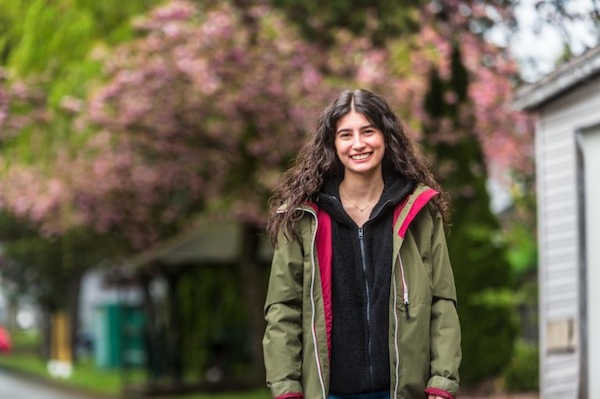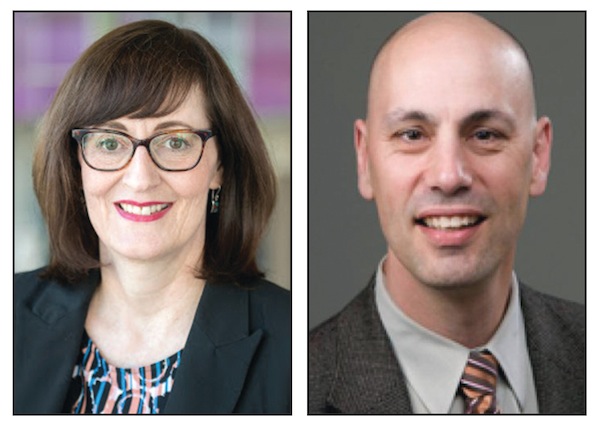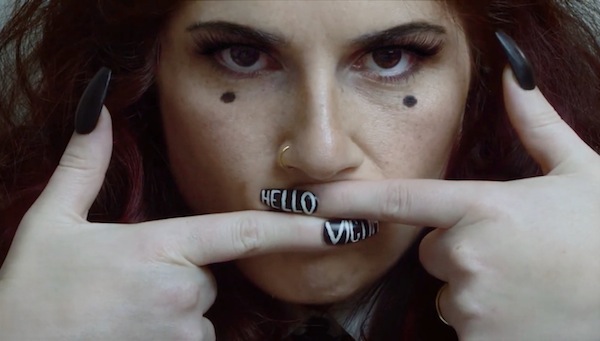Vancouver singer-songwriter Haley K. Turner will release her first full-length album on May 29.
“I have gone back and forth questioning whether now is the right time to release a new album,” she told the Independent. “But here’s the thing. Long before our lives were turned upside down, I titled my album in from the dark and, if right now is not the time to bring each other back in from the dark, I don’t know when is. This record was written with the intention of leaving people feeling a little more understood and a little less alone, myself included. So, while it feels like I am taking a huge leap of faith, releasing it while people may be too overwhelmed to notice, it also feels like I don’t have much of a choice. We don’t know what the future holds, and I happen to be fortunate to have completed the recording back in January. I want to share it with anyone who might find it comforting right now.”
A couple of singles from the album will be released earlier in May. Notably, “Loved You Perfectly” will come out May 8 for Mother’s Day that weekend. For the song video, Turner asked people to send in a short recording about their mom.
“Being privy to the sweet messages people have sent in for their moms is such a wonderful feeling,” she said. “I’m pretty sentimental, and it’s more of the thought about the moms’ reactions than the video itself that gives me little heart flutters.
“‘Loved You Perfectly,’” she explained, “is a song about motherhood, or at least my experience with it. With all the doubts and worries and mistakes, there is just as much love and growth and connection. I know I can’t be the only one who feels like I mess up all the time. And this song is my way of acknowledging that we can’t get it all right all of the time, but, even though we aren’t perfect, we love our kids perfectly. It felt like a good song to release around Mother’s Day.”
Speaking of motherhood, the Independent last spoke with Turner when she entered that phase of her life. “I went into labour with my son at 4:45 a.m. the same morning you interviewed me [by email] for my debut EP,” she said. “A couple years later, my daughter was born.” Her son is now 8, her daughter, almost 6. (For the article about the EP Ready or Not, see jewishindependent.ca/oldsite/archives/april12/archives12april06-29.html.)
“Making music and writing has always been a part of how I process emotions,” said Turner. “If I am not writing, I am usually bubbling up inside with some uncomfortable feeling and that never ends well. While it took me awhile to pick up the guitar and really get back into preparing for an album after starting a family, I was always writing in my head, even if it never made it onto a piece of paper.”
Having kids has changed her approach to life. “Well, I have a deeper admiration for my own mom now,” she said. “Yes, Mom, you! I have a greater understanding of the complexity of a mother and child relationship. I have spent the last couple of years processing who I was before kids and who I am now (hint, I’m still figuring that out) but, while a lot has changed, the really neat thing I have discovered is that, when it comes to making art, my intentions are still pretty much the same. Having little ones reinforced my ideas about media and made me more determined to create content that, hopefully, leaves this world better and not more wounded.”
The album in from the dark is more edgy than the EP Ready or Not. Last fall on Facebook, Turner posted what she described as a more cheery song than she had in awhile, but “Hey You” didn’t make the cut to the album.
“In order for me to commit to recording a song, I need to feel really connected to it,” she explained. “When I am writing, I often get emotional during the beginning of the songwriting process and that’s how I know it’s something I can stand behind. The lyrics mean everything to me, and it’s something I spend a ridiculous amount of time agonizing over.
“If I could have, I would have made a 20-song record because I have so many more songs I wish I could have included…. This album was about artistic exploration for me and testing out a few new sounds, stepping out of my comfort zone and letting my curiosity be the driving force even when my self-doubt wanted to weigh in. ‘Hey You’ felt like it would fit better on a different album, perhaps a future collection of songs for my kids, as a way to share with them all the emotions that come with parenting, along with my hope for them in this world. It felt comfortable to sing and play and I wanted to choose things that felt a bit more unsafe.
“Also,” she added, “in this recording process, my producer, Tom Dobrzanski, listened to all my demos and we chose songs that we both connected to. I believe that people have to be into what they are working on or it will be forced. So, we selected songs that felt right to both of us.”
In addition to Dobrzanski – who has worked with Said the Whale, and who used to be in the Zolas as a musician – on keyboards, Turner worked with several other notable musicians on in from the dark: Marcus Ambramzik, bass (the Belle Game, the Matinee); Brian Chan, cello (Jordan Klassen, Heis, Zaac Pick); Niko Friesen, drums (Hannah Georgas, Jane Siberry); Stephanie Chatman, violin; Julien Amar, piano on “For the Win”; and Adrian Glynn, vocals (solo artist as well as his band, the Fugitives). Turner is the lead singer and plays the acoustic guitar.
“I am beyond lucky to have had so many wonderful humans on this project,” said Turner, who reached out to Glynn a couple of years ago at an open mic.
“At the time,” she said, “I didn’t have any actual plans in the works to record, but I asked him if he would be up for singing on a song in the future. I have always loved male and female vocals together and it was on my bucket list.”
Through Glynn, she connected to Dobrzanski, who owns Monarch Studios, and, she said, “before I was even ready, I had committed to making an album!” She credits Dobrzanski for bringing “in an amazing team of Vancouver-based musicians who he had worked with before.”
Most of songs on in from the dark were written over the past few years, “and some even within the weeks leading up to recording,” said Turner. “‘Better’ is an older one of mine and it surprises me how relevant it still is. ‘Better’ is my way of processing how deeply women are affected by the expectations we have of them, specifically in our appearances. It’s about how we show up for each other, and expresses my desire to help create a world where we aren’t so hard on each other and hard on ourselves. I wrote it in my early 20s, before kids, and I am furious that it feels like it is taking forever to make these positive shifts.
“I have a background in TV and film and the constant critiques on my image and weight were damaging to say the least,” she explained. “When I released my debut EP, I had just stepped back from pursuing my career in acting because I wanted to be in creative control of the image and content I was putting out. I was so upset that I couldn’t do that as a 20-year-old actress – that it was always about looks and physique and never about my work – and so I decided to rebel by not putting my face on my album. I didn’t want that to weigh into whether people listened or not.”
Of all the songs on the album, Turner said, “‘Stay With Me (Jacob’s Song)’ holds a special place in my heart. It is dedicated to someone I loved dearly who passed away unexpectedly at the age of 8. It was the hardest song to record on the album because its essence is out of my control. I don’t think it will ever be good enough in my eyes, but I sure tried. I know that talking about people who are no longer here often brings pain and sadness to the surface. It was my hope to make a song that created space to honour and reflect and remember.”
Amid the pandemic, Turner is trying “to stay hopeful and focus on the blessings that will come out of this,” she said. “I’m processing the experiences slowly and watching for the creation and innovation that will help us heal.
“Prior to COVID-19, I was trying to engage in conversations with people, many of whom were women, about isolation, although I wasn’t phrasing it like that. Motherhood can be terribly isolating – beautiful and wondrous and lonely. Pretty much anyone anywhere can feel alone even with people swarming around them. I have been mulling over that thought for quite some time, so I ask myself, what’s different now?
“What’s different is that almost everyone is experiencing it in some form now, and perhaps it won’t be so hard to talk about it after things settle and people are able to integrate themselves back into their communities. I don’t think this feeling of isolation is new, I just think there is less to distract us right now. I really believe that, if we can be more transparent as humans, we will feel more connected. So, that’s what keeps me positive, I guess. If we felt alone before all these unexpected changes, the blessing is that we will come out with a stronger sense of what was missing and how to fulfil that for ourselves and others.”
She added, “I also have a greater appreciation for those who have shown up and worked hard to bring people together, like our teachers and artists everywhere and people in all types of service industries. Sometimes you don’t realize how much you rely on someone or something until it’s not accessible anymore. I have a better understanding of the different skill sets people have, and how I value them will be forever changed.”
For more information on Turner and her music, visit her website, haleykturner.com.



